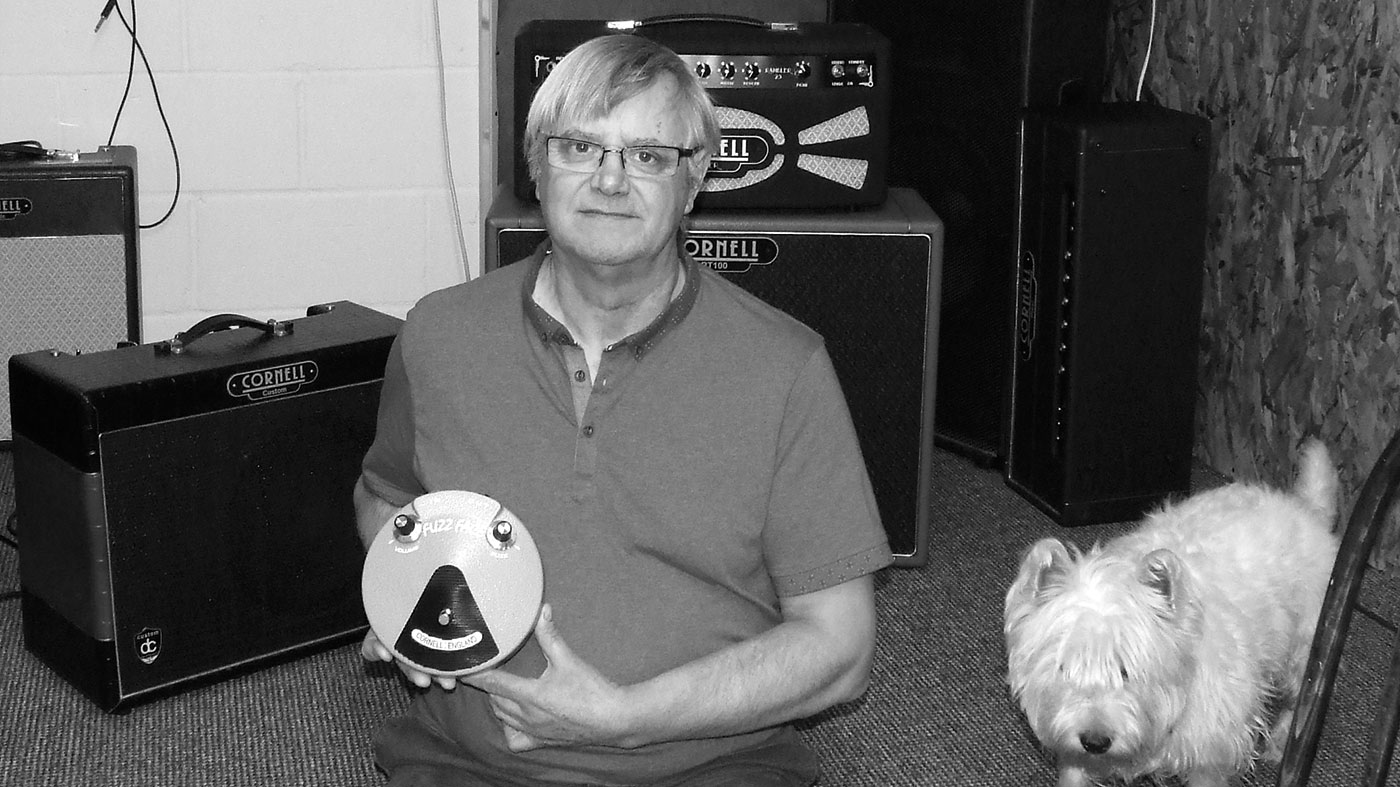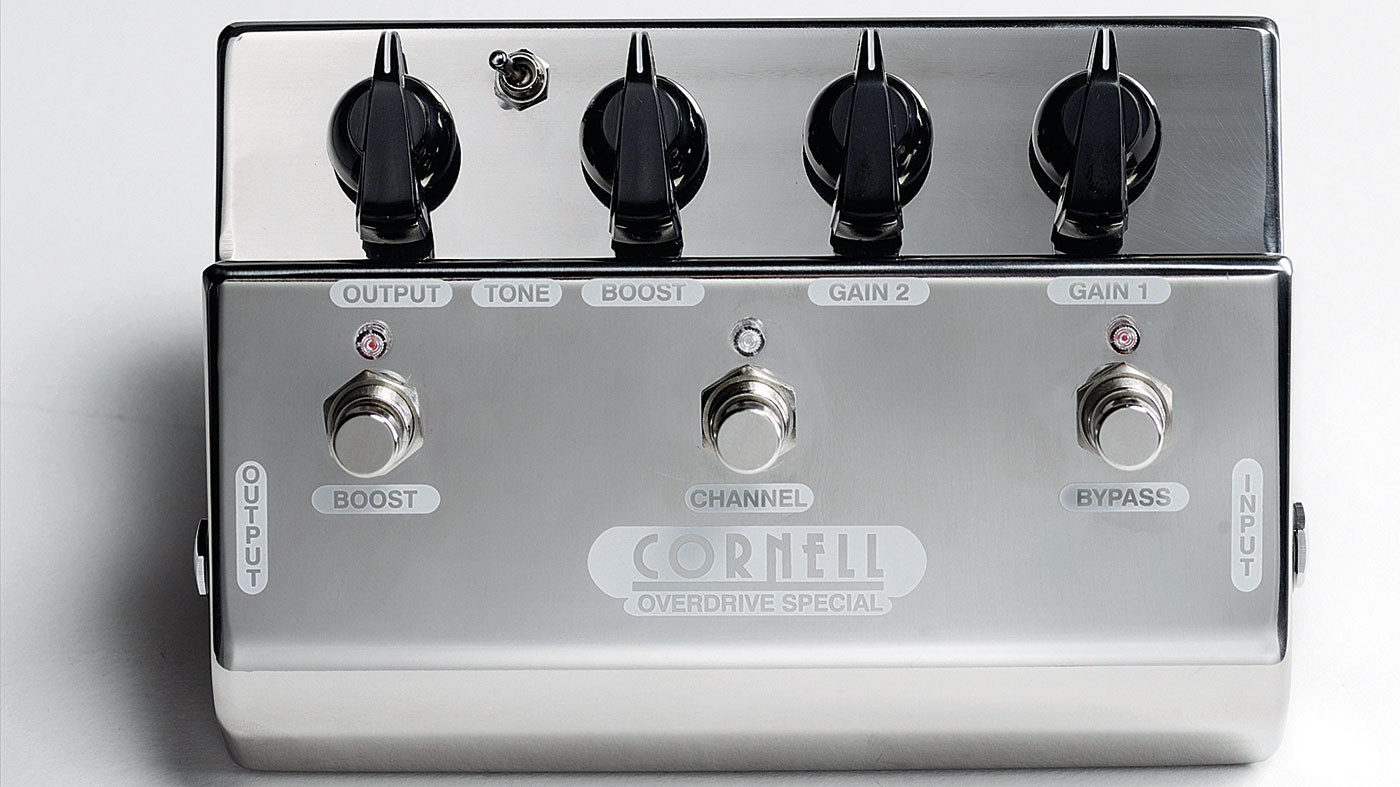
Want all the hottest music and gear news, reviews, deals, features and more, direct to your inbox? Sign up here.
You are now subscribed
Your newsletter sign-up was successful
Tone guru Denis Cornell of Cornell Custom Amplification talks classic fuzz and reveals his latest addition to the guitarist’s toolbox…
1. What was the first pedal you built and how did the design come about?
“I made loads of Fuzz Faces for Dallas Arbiter. I’d just finished a five-year apprenticeship and they needed someone to test their Fuzz Faces. They all sounded different because the gain in the transistors tended to vary and a lot of the problems didn’t show up until you played the guitar. In fact, one of the reasons I got the job was because I played guitar!”
2. What’s your best-selling pedal and why do you think that is?
“The First Fuzz, because of the history I have with [the original Fuzz Face] and the fact we use carefully selected germanium transistors and carbon comp resistors. That’s what we used originally. I’ve tweaked the design and fine-tuned them personally from years of experience. That is the original circuit - so that’s why it’s called The First Fuzz.If that’s what you want, then that’s the one to buy.”
3. Is there anything new on the horizon with Cornell effects?
One of the big problems with effects is you can take a pedal by anybody and it’ll work great in one amp but not work great in another amp
“We’re working on a new mid boost that’ll be coming out shortly. I think the title of it will be the Mid Boost… For many years we’ve made a mid-boost circuit that fits into a guitar (like the Clapton Strat) and we’re taking that circuit and putting it into a pedal. We’re looking at designing pedals that are tools to do a certain job, rather than effects that are unique to the sound of a particular guitarist. In other words, we’re encouraging people to find their own sound.”
Want all the hottest music and gear news, reviews, deals, features and more, direct to your inbox? Sign up here.
4. Tell us a secret about effects you’ve discovered…
“One of the big problems with effects is you can take a pedal by anybody and it’ll work great in one amp but not work great in another amp. That’s an important thing for people to know - effects won’t necessarily sound the same from one amp to another. People need to test effects pedals out on the amp they intend to use before they buy.”
5. Can you advise on some common mistakes made with effects…
“Keep the signal at the right level going into the amp. You need to keep in mind that when you’re adding effects pedals into your sound, you need to watch the levels because it affects amplifier [response] so much. I’ve found a lot of people add a little bit of gain on one pedal, a bit more on another, then more on another, and the amplifier might not be able to take that amount of signal.”

6. What’s your favourite vintage pedal and why?
“The Fuzz Face. That is the pedal if you want that classic Jimi sound. You can hear guitarists using that sound on records today. It keeps coming back. It’s timeless. It’s very basic, but I think that’s what makes it so good. Pedals with lots of components colour the sound and that isn’t necessarily what you want to do. Often the more components there are in a pedal, the more you lose the feel from your guitar.”
7. What three pedals would be on your ‘desert island’ pedalboard?
“A Cornell Overdrive Special, a Dunlop wah and an analogue delay pedal. That’s a very good basic setup.”
8. What are your favourite effects pedal moments to be heard on record and why?
You’ll get some guitarist that really likes a pedal and you find that everybody suddenly wants to buy one
“(I Can’t Get No) Satisfaction by the Stones because it’s just iconic. Also, Jimi [Hendrix] with the wah on Voodoo Child (Slight Return). It’s just very vocal.”
9. What problems have effects designers yet to crack?
“The general public. I think it’s knowing what people expect from a pedal. Certain pedals seem to be flavour of the month. You’ll get some guitarist that really likes a pedal and you find that everybody suddenly wants to buy one, and I think that’s kind of problem because you get a lot of followers that can’t get the same sound when they buy it.”
10. Are there any long-lost gems you think would be worth reissuing?
“The only thing that comes to mind is the old WEM tape echo, but the problem with that is it’s so distorted and noisy that it would need a rethink. You could do it but the cost of it would probably be outweighed. When it comes to delay, the digital ones are very, very good nowadays, but they haven’t got the presence of the old valve Copicats. It’s more of a noise than a true echo sound, but some people like that!”
Guitarist is the longest established UK guitar magazine, offering gear reviews, artist interviews, techniques lessons and loads more, in print, on tablet and on smartphones
Digital: http://bit.ly/GuitaristiOS
If you love guitars, you'll love Guitarist. Find us in print, on Newsstand for iPad, iPhone and other digital readers


